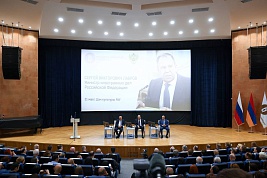Deputy Foreign Minister Igor Morgulov’s answer to a question from TASS news agency about Russia’s role in the settlement process on the Korean Peninsula
Question: Some observers have noted that the declaration signed in Panmunjom by the leaders of the Democratic People’s Republic of Korea and the Republic of Korea on April 27 stipulates the possibility of holding trilateral meetings that would involve North and South Korea and the United States or four-sided meetings (plus China) in the context of the Korean peace settlement. However, the document does not mention Russia. Does this mean that Russia may drop out of the settlement process on the Korean Peninsula?
Igor Morgulov: I am confident that such apprehensions are groundless. Russia will not drop out of the process; on the contrary, it is determined to continue searching for solutions to all the problems of the Korean Peninsula in the most proactive manner.
Your question is probably motivated by the fact that inexperienced observers may have, indeed, failed to grasp the essence of the Panmunjom Declaration. You see, the Declaration mentions possible dialogue formats on the results of the Korean War of 1950-1953, specifically, the replacement of the Armistice Agreement with a peace treaty. In this connection, I would like to point out that the Soviet Union was not involved in the Korean War, which ended with the signing of the Armistice Agreement, or in the talks on signing this document.
By the way, the Russian-Chinese roadmap for the Korean peace settlement, drafted in 2017, clearly sets out Russia’s position on this matter. This position implies that the process of signing a peace treaty that would replace the Armistice Agreement is solely the subject of bilateral relations between North and South Korea and should be conducted by Pyongyang and Seoul. In fact, the Panmunjom Declaration reflects this approach. Russia has no legal grounds or motives to become a party to this treaty. I repeat, this is the prerogative of the countries that were directly involved in the Korean War.
Instead of becoming immersed in the conflicts of the past, Russia believes its role is to conduct energetic and painstaking work for the future. This boils down to joint efforts to create a solid and lasting mechanism of peace and stability on the Korean Peninsula and across Northeast Asia that would heed the interests of all the concerned parties. As has repeatedly been stated, we perceive a comprehensive discussion of the sub-region’s issues in a six-party format involving Russia to be a tool for achieving this goal. In fact, there is simply no alternative to this format.
